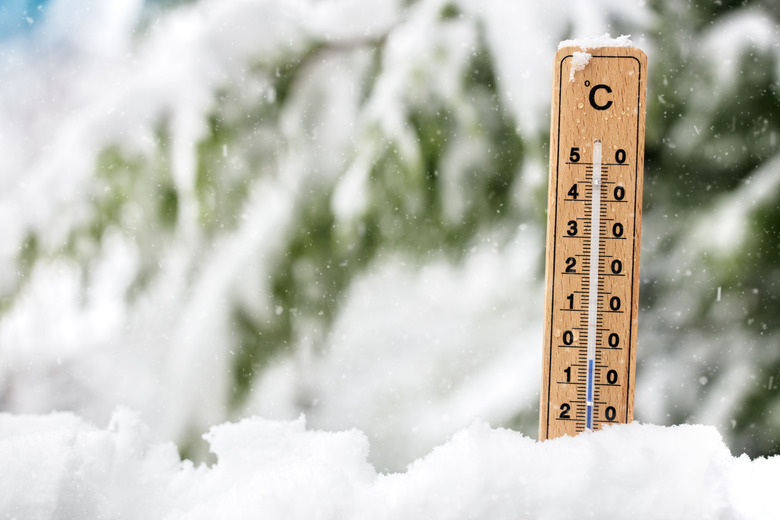What Happens When You Get Frostbite?
'Tis the season for frigid weather. And depending where you live, you're already dealing with dropping temps – or just watching as your friends in other parts of the country bundle up just to keep from freezing.
If you grew up in a place with cold winters, chances are your teachers warned you about one thing over and over: frostbite. So you probably already know the basics, which is that frostbite happens when your skin (and, eventually, the underlying tissue) starts to freeze. And you've probably heard the horror stories about how it can kill your tissue, and even – yikes – make appendages fall off.
But what's happening on a cellular level when you get frostbite, and how can you avoid it? Read on to find out.
The Science of Frostbite
The Science of Frostbite
If you've ever sweat your butt off on a hot day – or shivered like crazy on a cold one – you've experienced firsthand the way your body adapts to changes in temperature. And it turns out, that completely normal and healthy response can actually contribute to frostbite.
How? Because when you're exposed to cold temperatures, your body constricts the blood vessels in your skin, so there's slightly less blood flow. That's a good thing – it keeps more of your blood farther into your body, where it'll lose less heat and make it easier to maintain your core body temperature, so you can avoid hypothermia. But it also has a negative side effect: Your skin gets less warm blood flow, so it's especially vulnerable to cold.
That means that when you're out on a windy winter's day, that freezing air can cool down your skin quickly – and, depending how cold it is, it can start to freeze your skin in just a few minutes.
So How Does Freezing Damage Your Tissue?
So How Does Freezing Damage Your Tissue?
To understand why frostbite is harmful, think back to your middle school science classes, where you learned that water forms crystals and expands when it freezes. That's all well and good when the water has room to expand – say, if you left a glass of water outside to freeze – but it's bad when it happens in your cells.
See, the expanding water and the forming ice crystals damage and stress your cells, and can ultimately kill them. The change in temperature also permanently changes your cell chemistry, because the enzymes that make your cells function can't work under such low temperatures. Plus, deeply frozen tissues can't get a steady supply of warm blood, which means they're also starved of oxygen.
In other words, freezing damages the tissue forever. And while you may recover from superficial frostbite, which only affects the skin, deep frostbite that affects the underlying tissues won't ever come back. That's why people end up getting toes or fingers amputated – once the tissue has been frozen, it dies and won't ever come back to life.
How to Prevent Frostbite
How to Prevent Frostbite
So frostbite can range from terrifying – uh, who wants to lose a toe?! – to recoverable but painful. Best to just avoid it, right? Here's how to do that.
- **Limit your time outside.** This one's obvious, but needs to be mentioned! Avoid going out in super-cold temperatures for long periods of time.
- **Stay covered, especially when it's windy.** Icy cold winds can start causing frostbite in 10 minutes or less. Keep your face covered if you have to be outside.
- **Protect your hands and feet.** Your extremities are especially vulnerable to frostbite. Bundle up with warm mittens, as well as thick socks and winter boots if you have to go outside.
- **Recognize the early signs of frostbite.** Keep an eye out for skin irritation and stinging when you're outside. Start getting anxious when you skin feels warm or numb – it's a sure sign of frostbite.
- **Get medical attention ASAP.** The faster you address frostbite, the less likely it'll be that you suffer long-term damage. Get to a doctor if you suspect you have frostbite. Sometimes, the true tissue damage only becomes obvious over the next few days, so the faster you can get help, the better.
Cite This Article
MLA
Tremblay, Sylvie. "What Happens When You Get Frostbite?" sciencing.com, https://www.sciencing.com/the-science-of-frostbite-13722460/. 12 December 2019.
APA
Tremblay, Sylvie. (2019, December 12). What Happens When You Get Frostbite?. sciencing.com. Retrieved from https://www.sciencing.com/the-science-of-frostbite-13722460/
Chicago
Tremblay, Sylvie. What Happens When You Get Frostbite? last modified March 24, 2022. https://www.sciencing.com/the-science-of-frostbite-13722460/
